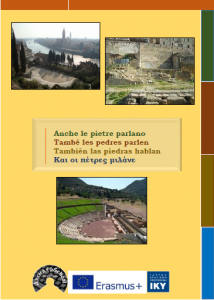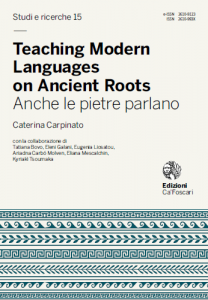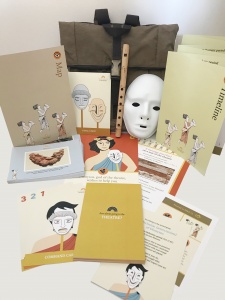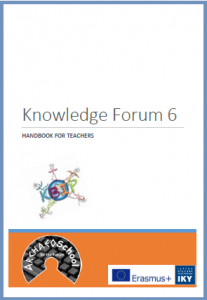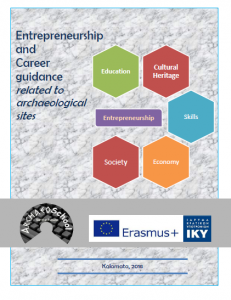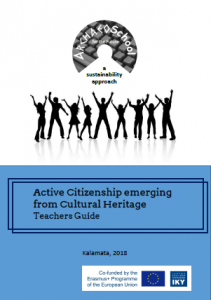During the 3 years of the project, the following Intellectual Outputs were produced. Some of them have been re-published after the end of the project according to the precious feedback of educators using them in their classes.
O1-Project website
Website for project dissemination including:
• Project Scope, target group
• Outputs of the project
• Policy dialogs (Municipalities, School counselors, actors of Education)
• Press conference texts
• Calendar of dissemination/multiplier events and Info days
• Photos-videos
• Links to the curriculum of universities for entrepreneurship and archaeological sites
O2-Handbook and languages learning material - on line
Handbook for languages courses
- in modern Greek, Italian, Catalan and Spanish (about 80 pages each, level A1-2/ B1: Five teaching units A and A2 level, three teaching units B1 and B2 for modern languages and
- a unit teaching introductory knowledge of Latin and ancient Greek (beginners).
Each handbook will present some learning units in each language with a common background: learning a modern European language less wide taught to understand different cultures and the common heritage of the European languages. The teaching tool and online tutorials to enable teachers and students of the project to follow a unique training program focused on the study of modern languages as a result of the linguistic heritage alive ancient Greek and Latin.
The handbooks will offer then the opportunity to read, write, study linguistic and cultural subjects on European modern languages (Italian, Catalan/Spanish, and modern Greek) and a guide on the historical mother languages (Ancient Greek and Latin).
Each handbook will be offered to pupils in pdf and on line.
Small amount of hard-copies.
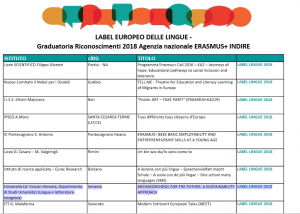 Ca'Foscari University and ArchaeoSchool project won European Label 2018!
Ca'Foscari University and ArchaeoSchool project won European Label 2018!
According to INDIRE website:
"Sul fronte del multilinguismo, spicca l’idea di Ca’ Foscari di dar vita ad una “archeoschool” per studenti liceali e universitari (oltre 600 in totale, dai 15 ai 45 anni!), finalizzata a stimolare la comprensione delle lingue neolatine e neogreche a partire dalle competenze in lingue classiche, scegliendo il teatro antico come luogo ideale per approfondire il rapporto tra le lingue e i beni culturali –archeologici."
Translation to English: On the front of multilingualism, Ca 'Foscari's idea is to give life to an "archeoschool" for high school and university students (over 600 in total, from 15 to 45 years!), Aimed at stimulating the understanding of Neolatine and Neo-Greek languages starting from the skills in classical languages, choosing ancient theater as an ideal place to deepen the relationship between languages and cultural-archaelogical heritage. Even Unistrasi has committed itself to this front, with a project for multi-lingual teaching in primary school.
Download the list of winners.
O3-Educational Museum kit
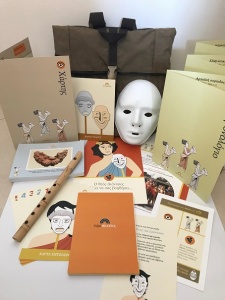 Download all printed material of Museum Kit
Download all printed material of Museum Kit
(in GREEK)
This kit is addressed to group of visitors or secondary school teams that visit ancient Messene in order to self explore the archaeological site and the respective museum. It includes educational material facilitating cross-curricular learning such as educators' guide, works of art and primary sources (texts, maps, topographic, images and photographs) and step-by-step exploration plan of the archaeological site through concrete learning activities. The most important excavation findings, public buildings, sanctuaries, fortification and tombs are noted as also as the social-economic status of the city over all its historical periods (from the first habitation to today).
Intellectual Output O4 - KB e-learning handbook
In order to support C2 training activity (e-learning on Knowledge Building Forum platform-KF5) CDL prepared a supportive pedagogical material addressed to teachers.
This material includes the theoretical background on Knowledge Building theory, a user manual of KF5* and some examples of use in class.
*On January 2017, Knowledge Forum is being updated to version 6, so the handbook has been revised.
O5-Virtual reconstructions in EdMondo
VIDEOS: Look how we 3D-produced
- the main Theatre in ancient Messene and
- Amphitheatre of TarragonaScreen shots from theaters of Verona, Tarraco and ancient Messene
3D digital reconstructions of the 3 main buildings in the archaeological sited that will be investigated by all schools.
KPEK will be responsible for the output in cooperation with a representative of INDIRE (non-partner but provides EdMondo digital environment to this partnership) as the technical advisor and expert in EdMondo. Schools and EFAMES will make all steps needed to reconstruct the buildings and EFAMES, UNIV Ca'Foscari, CDL will have the scientific support of the final products. Also, 2 other schools (teachers and students) from Italy that have great expertise in EdMondo, will provide help and guidance via EdMondo to partners.
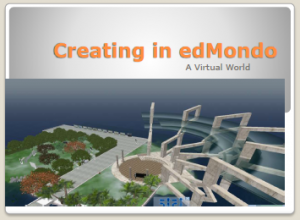
Download a presentation (PPT) about creating objects in EdMondo.
In order to access EdMondo worlds, you have to install the software:
Download “Imprudence” viewer (https://sourceforge.net/projects/imprudence.team-purple.p/) and use the following data to enter
Name = ArchaeoSchool
Lastname= Project
Password= ArchaeoSchool
For new EdMondo accounts: http://slw.indire.it:8002/wifi/user/account/
O6-Knowledge Forum community
Data Analysis (gathered from pupils collaborative research) (presentation and respective text)
Schools project teams will study and work on local archaeological sites (ancient Messene, Verona theater, Tarraco and Empúries) in three stages: initial, deeper and profound research. They will study the past and present through a reading and active participation of the archaeological heritage documented in their city and in the area surrounding them. This activity of study and research will be accompanied by language training in modern and ancient Greek, Italian and Latin, Spanish / Catalan. The teaching methodology will be based in Knowledge Building theory and on ESD and partners will collaborate in the research by exchanging answers and resources via the Knowledge Forum platform (KF).
In each stage, concrete questions will be drawn regarding the archaeological sites and schools project team will investigate for answers. These questions will be the same for every school partner and will be published to the KF for open discussion (between pupils, teachers and rest partners). The data collection in KF will form the final output.
O7-Career guidance and entrepreneurship related to archaeological sites
See the output outline: http://archaeoschool.eu/3rd-year-activities/entrepreneurship/
This guide isseparated in two sections: Career guidance and entrepreneurship. The first section includes information regarding innovative occupations in relation to the archaeological sites and the respective studies that have to be followed in every partner country (guidance orientation). These information were collected by the students according to their needs, either by interviews either by bibliographic research.
The second section includes concrete steps for a start -up business process in each country. Schools project teams chose and created virtual enterprises and they followed the proposed business plan. the results of students' work are presented in the book, too.
O8-Video from EdMondo virtual act plays
See the outputs:
http://archaeoschool.eu/3rd-year-activities/edmondo-videos/
Based on the study and work of the archaeological sites and the virtual visual reconstructions, schools project teams will write teaching scenarios to highlight sustainability policies in these ancient societies and cities and will use EdMondo in order to apply these scenarios in form of virtual role play of their avatars. Then, they will extract these avatars role plays in form of videos.
Each video will be in mother language of pupils (Greek, Ancient Greek, Italian, Latin, Spanish and Catalan) that have created it and it will be subtitled in English.
O9-Teachers Guide - Active citizenship emerging from Cultural heritage
This guide is addressed to teachers in order to use it in respective projects or interdisciplinary courses is the formation of new citizens capable of respecting the past, make it part of their present and deliver it to the future.
The guide includes the results of the study and work of the involved archaeological sites, the virtual 3D reconstructions and teaching units respective to the theoretical framework of the methodology and tools applied during the project. Specifically, the teaching units include resources, curricula, learning activities in class, in the archaeological site and respective museum and covers all thematics of the project:
- Presentation of archaeological sites
- Language and Culture, the influence of Greek and Roman Cultural heritage
- Economy, Society and Environment - issues answered by pupils
- Cultural Virtual heritage
- Knowledge Building theory and the relationship between the 12 knowledge building principles and the new learning skills
- EdMondo Virtual World for schools
- Career guidance and basic principles of Entrepreneurship and archaeological sites in relation to Sustainability
- Sustainability principles and Education for Sustainable Development : theory and interdisciplinary experiential activities in and out of the classroom
- Educating future active citizens: theory and practice

